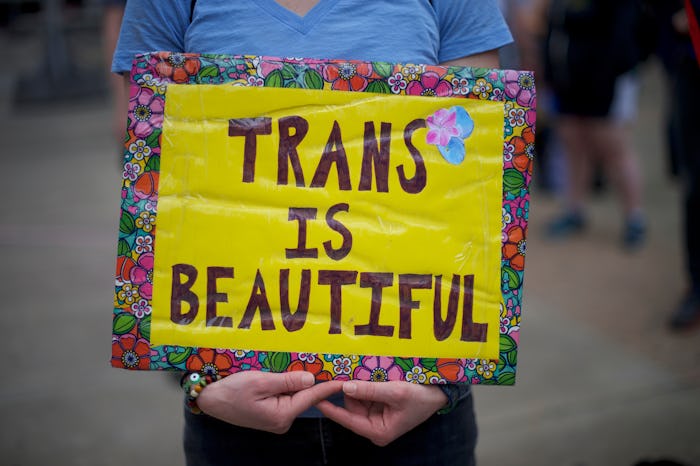News

The AAP Says Trans Kids “Know Their Gender” & Should Be Believed In New Guidelines
For trans and gender diverse kids, having proper support makes a world of difference. Navigating home and school life can present an incredible challenge for trans children, but the important role that the medical field plays in this shouldn't be ignored, either and it seems some organizations are making that clear. In new guidelines, the AAP says trans kids "know their gender" and should be believed.
Over the past few years, the rights of trans children have been consistently infringed upon. After the Department of Education, under Betsy DeVos, rescinded protection allowing trans students to use the bathrooms matching their gender identity, students watched as the government escalated by refusing to investigate or take action against discrimination complaints.
These systematic failures have severe consequences. Recently, in August of 2018, Facebook posts circulated of adults threatening a 12-year-old trans girl in Oklahoma, as reported by The Washington Post. And in Jan. 2018, Vice reported on doctors refusing to treat trans patients.
It's imperative that trans kids are backed by their doctors, who likely have some influence in conversations with their parents. The American Academy of Pediatrics has begun to take steps to protect the rights and lives of trans children. And that's incredibly important.
Back in 2017, the AAP released a statement in support of trans children, adolescents, and adults. In that statement, the AAP noted:
"As pediatricians, we know that transgender children fare much better when they feel supported by their family, school and larger community. Shaming children based on their gender identity or expression is harmful to their social-emotional health and may have lifelong consequences. This includes public discourse that de-legitimizes the contributions that transgender individuals make to society."
When trying to seek medical help, it's important that professionals are able to appropriately navigate conversations and offer support. That's why these new guidelines matter. In their guideline, the AAP wrote:
We review relevant concepts and challenges and provide suggestions for pediatric providers that are focused on promoting the health and positive development of youth that identify as TGD while eliminating discrimination and stigma.
The AAP also said:
Pediatric providers are increasingly encountering such youth and their families, who seek medical advice and interventions, yet they may lack the formal training to care for youth that identify as transgender and gender diverse (TGD) and their families.
In this discussion, mental health can't be ignored. According to the AAP's statement, a study found 56 percent of trans youth reported suicidal ideation and 31 percent reported a suicide attempt. Those rates are much higher compared with the respective 20 percent and 11 percent among youth who identified as cisgender.
Although it might be easy to solely blame those statistics on bad parents, the reality is the influence of professionals cannot be ignored. If you are denied access to mental health care because the medical system itself poses a threat to your mental health, then there's compounded risks.
The role that structural biases play was affirmed by the American Psychological Association in a 2012 statement, which the AAP quoted as:
Being transgender or gender variant implies no impairment in judgment, stability, reliability, or general social or vocational capabilities; however, these individuals often experience discrimination due to a lack of civil rights protections for their gender identity or expression.… [Such] discrimination and lack of equal civil rights is damaging to the mental health of transgender and gender variant individuals.
Hopefully, these guidelines will help lead to the beginning of crucial change within the medical field. It is also up to cisgender people to continue educating themselves and listening to trans voices. The lives of children depend on it.